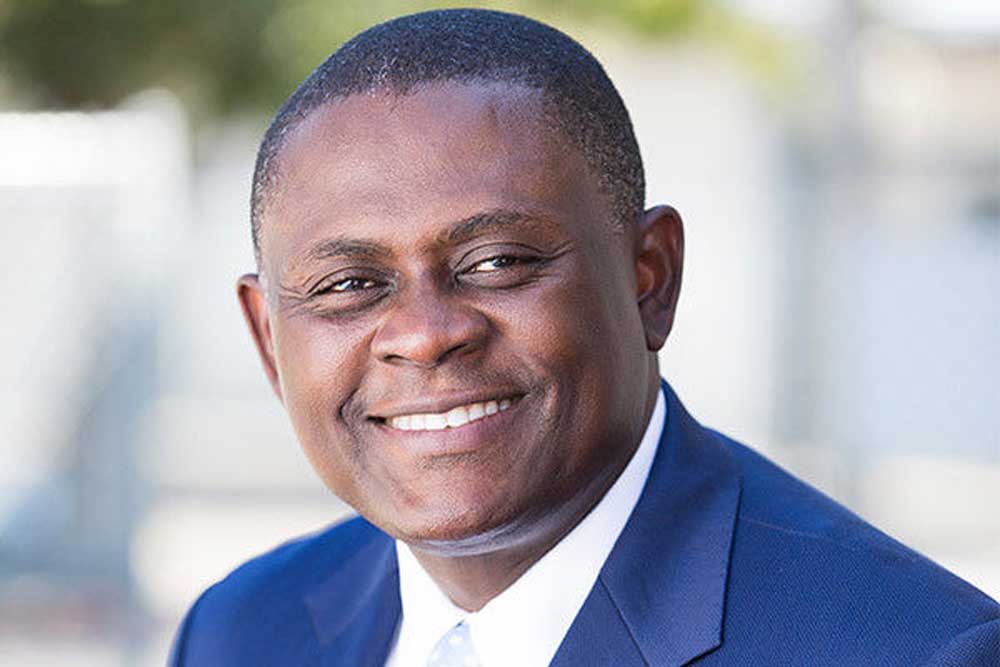Famed doctor Bennet Omalu, who discovered degenerative brain disease in athletes, inspires Tyler leaders
Published 4:49 pm Tuesday, August 30, 2016

- Courtesy
The famed forensic pathologist who discovered a deadly brain disease impacting several former National Football League players inspired Tyler leaders on Tuesday.
Dr. Bennet Omalu, portrayed by Will Smith in the film “Concussion,” was the keynote speaker at the Leadership Live 2016 event at Green Acres Baptist Church’s Crosswalk Conference Center.
He spoke about 40 minutes on the importance of self-love, truth and embracing everyone’s humanity.
“Dr. Omalu is an exceptional example of leadership in the face of adversity,” Smittee Root, executive director of Leadership Tyler, said. “His story has the ability to inspire not only the fresh faces of Tyler, but the seasoned leaders of our community.”
In recent years, he’s faced rejection and was condemned by some doctors and the NFL due to his findings about chronic traumatic encephalopathy, or CTE. Despite the turmoil, he kept fighting for the truth, he said.
“No university, no research organization would open doors to me,” Omalu said.
“I lost it all. I lost everything I had. I lost my job. I was unemployed for six months.”
I still held onto the light of the truth.”
Omalu attributes the backlash to what he calls conformational intelligence. He said in society, people tend to accept what has been known as fact, even when new evidence is produced.
He said as humans evolve, we become more intelligent. Certain things that used to be fine are later found to be wrong, he said, pointing out eras when things such as smoking, asbestos and child labor were all acceptable.
A BELIEF IN SELF
Born in Nigeria during a civil war, Omalu faced malnutrition. Despite a rough childhood, he noted he was able to overcome many obstacles.
For the first five years of his life, he said he thought he was “a nobody,” and suffered from low self-esteem. He spent most of his time alone with books.
He said in Nigeria, the brightest students are expected to become doctors, and he did. However, he dreamed of being a pilot. Nonetheless, he was in medical school by 15 and became a doctor by 21. He’s since obtained several post-graduate degrees and certifications and has garnered awards and recognition for his work with hronic traumatic encephalopathy.
As an adult, he also suffered from depression.
“I’m not ashamed to say I was struggling with depression,” he said. ” So examining brains gave me a life.”
His findings about CTE reminded him that even one person can make a difference, as the sports world is changing to ensure athletes are safe from head injuries.
“There can only be one you in the history of mankind,” he said. “There can never be a replica of you. Nobody can be better than you being who you are. Don’t let nobody do this to you. No one can tell me who I am, what I should be or not be.”
He encouraged the audience to be bold and stand up for truth, using the analogy of a star.
“Each star is different,” he said. “You, by your own right, are a star. You have vibrancy in you. Don’t look sideways to see how bright the other stars may be. You’re denying who you are. Look within yourself.”
Audience members said they were enlightened by Omalu’s message.
“I thought he was very empowering and really drove home the important point of being who each and every one of us were made to be,” said Stephanie Taylor. “He drove home the impact we can have in our community and not letting others stifle that impact.”
TAKING ON THE NFL
The inspiration for Omalu’s relentless search for the truth about what was happening to former football players came on Sept. 28, 2002, when he examined retired football player Mike Webster.
The 50-year-old had played in the NFL for 17 years and died suddenly, following years of financial and mental health issues. He had battled depression – one of the signs of the degenerative disease. Omalu didn’t like the conversations being had about Webster.
“They were making fun of him on TV,” he said. “I felt offended, because I too suffered from depression. … Nobody has a right to talk about somebody in such a negative way.”
He added, “Many retired NFL players were suffering in silence and everybody chose to look the other way.”
Omalu said he’s a man of faith, and his faith merges with his practice of science.
“Faith and science come together in the truth,” he said. “In living that faith and practicing my science, I discovered that a spirit lives in each and every one of us.”
He pointed out the importance of seeing the humanity – and honoring – patients who are on his table.
“I saw myself in Webster,” he said.
Omalu said he was not familiar with football before he began researching CTE and had no agenda. Today, he advocates that children should not play contact sports.
“For children, we need to find more brain-friendly games for them,” Omalu said. “High impact contact sports should be 18 and above. That is when your brain is fully developing – from 18 to 25. Just like we’ve dong with smoking and alcohol, we need to protect our children from harmful effects.”
He added, “Brain injury is more harmful to you than cigarette smoking, so why would we ban cigarette smoking and still let children damage their brains? It’s a misappropriation of priorities.”
There is no cure for CT,E but only one thing works, Omalu said.
“The cure is prevention,” he said. “As physicians we need to be honest to the public.”
Twitter: @CDillard_TMT






